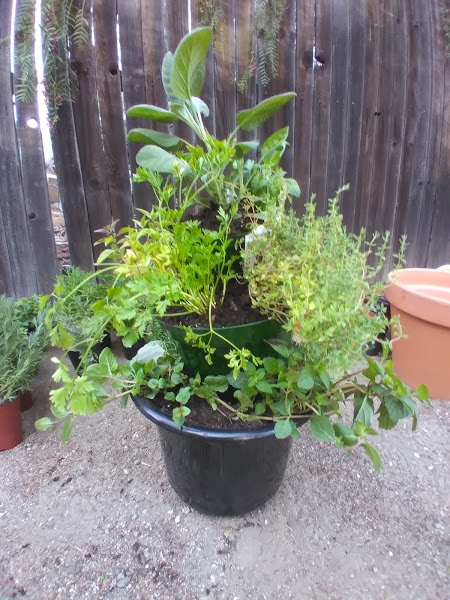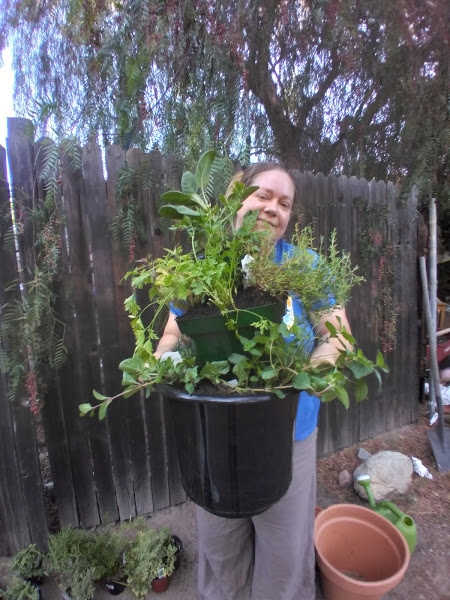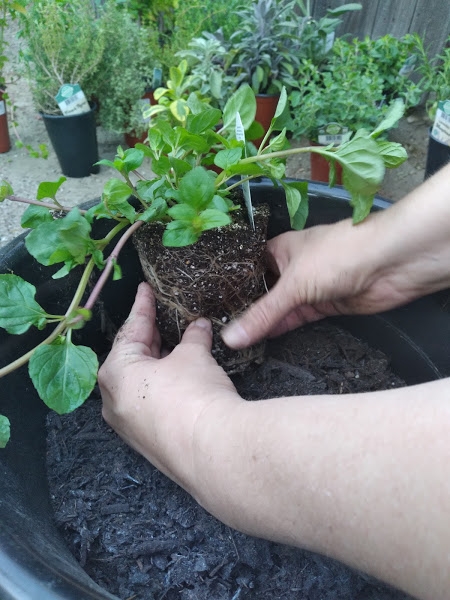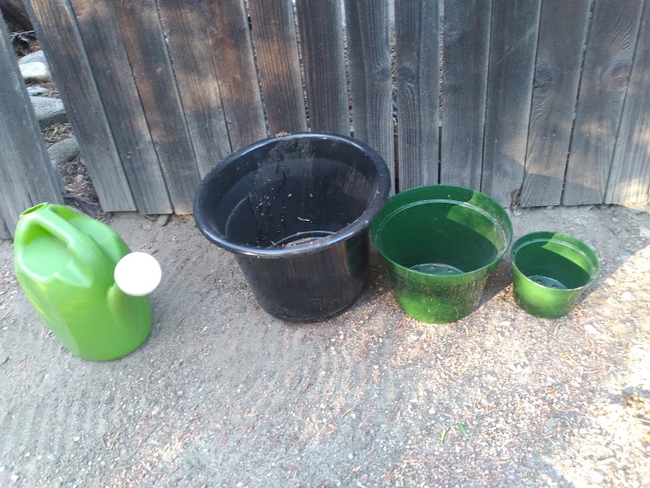- Author: Deborah Schnur
In my previous blog, I gave an overview of the first two days of COMPOST2023. The event, hosted by the The US Composting Council in January, was an outstanding learning and networking experience. In Part 2, I'm excited to discuss the rest of the event, including the conference sessions at the Ontario Convention Center and Demo Day at One Stop Landscape Supply.
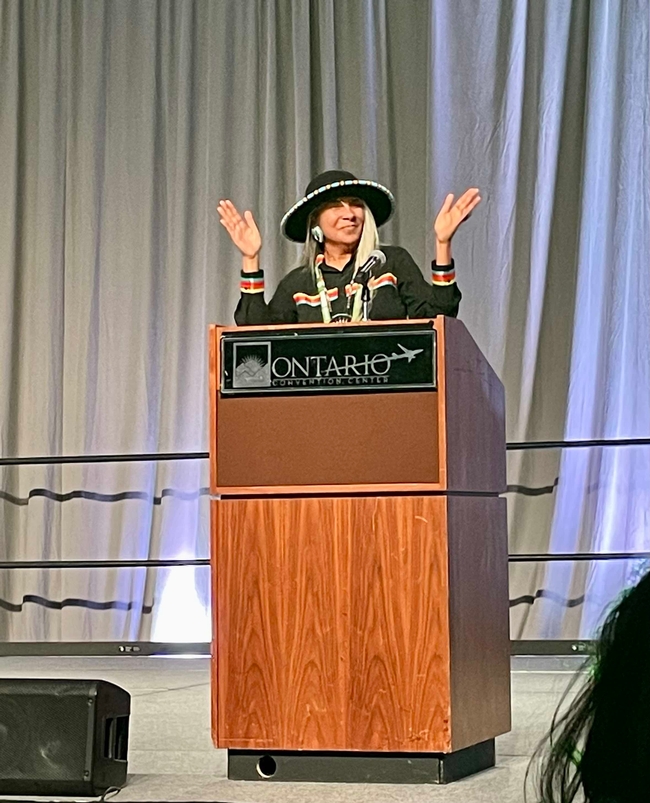
After the keynote, I wandered over to the Exhibit Hall, eager to check out the vendors and information tables. Major equipment vendors such as Komptech and Ecoverse showcased their massive composting machines, while product manufacturers offered samples of compostable bags and utensils. One of the biggest trends was biochar—a carbon-rich, charcoal-like substance created by burning organic material without oxygen. It was interesting to see that even pistachio shells can be used to produce this substance! When blended with compost, biochar enriches the soil by increasing its moisture retention, nutrient content, and microbial activity.

The final presentation I attended on opening day was “Healthy Soils for Healthy Parks: Los Angeles Urban Carbon Farm at Griffith Park” by Lynn Fang, a well-known educator and researcher in composting systems and soil science. LA Compost recently established its first park-based compost site at Griffith Park, using food waste collected from local farmers market drop-offs. Lynn's presentation highlighted a demonstration project of the Healthy Soils for Healthy Communities Initiative, led by TreePeople in partnership with LA Parks and Recreation, Kiss the Ground, and LA Compost, to promote regenerative park management. The study site was a flat, grassy area south of Crystal Springs, where individual plots were treated with mulch from Griffith Park, compost from LA Compost, or no amendment as a control. After 9 months, the researchers found that mulch and compost increased the activity of soil organisms and the percentage of soil organic carbon.
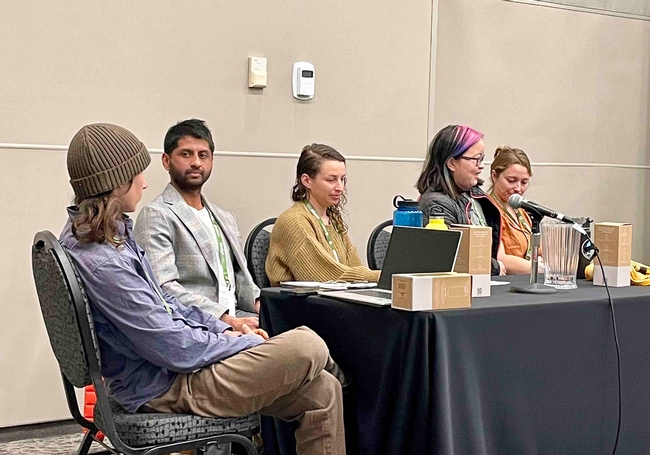
Other panelists showed how technology can facilitate community composting. Tess Feigenbaum, the Cofounder and Operations Director at Epic Renewal in Rhode Island, announced plans to release a mobile application to help with compost site management, process tracking, data collection, and environmental impact reporting. Sashti Balasundaram, the Founder and CEO of WeRadiate, is leading the development of smart sensors for compost piles, which measure temperature and moisture with remote, real-time monitoring.
The final panelist to speak was Elinor Crescenzi, who shared data on the 31 Community Composting for Green Spaces (CCGS) sites in the Inland Empire. Despite a modest $224K budget for labor and infrastructure, these sites managed to divert about 510K lbs of food scraps and 3.7M lbs of organic material from landfills, resulting in emissions reductions equivalent to 908 metric tons of carbon dioxide. That's similar to taking 200 vehicles off the road for one year! In addition to the environmental impacts, the CCGS program also had significant community and social impacts, such as increasing healthy food access, community engagement and education, social support networks, and psychological well-being. Ninety percent of the sites are growing food in addition to making compost.
Another interesting session was “Compost Market Dynamics in California”. One of the speakers was Jeff Ziegenbein, the site manager of the largest indoor compost facility in North America, the Inland Empire Regional Composting Facility (IERCF). Located in Rancho Cucamonga, the facility produces over 200K cubic yards of compost annually from recycled wood and green waste, biosolids, and horse stable bedding using the Aerated Static Pile process. The composting area is completely enclosed to meet air quality regulations. The filtering system does such a good job at odor control I didn't even know this facility is literally in my backyard. The compost, marketed under the SoilPro brand, is used in a variety of applications, including landscaping, horticulture, turf management, agriculture, and roadways.
After attending the morning sessions, I returned to the Exhibit Hall for some Q&A with the finalists of the Emerging Composter Competition. The first place winner was Greg Mankowski of Evolve Pet Composting Services and Consultation in Michigan. His business is very timely, as more and more states, including California, are passing laws to allow human composting. Second place was Justin Brann of Crystal Coast Compost in North Carolina, who composts food waste from many sources, including residences, businesses, farmers markets, and events. Third place was Jameson Meyst of Juicycles, who collects unpicked fruit from San Diego orchards, juices it onsite, and distributes juice and fruit popsicles to the community while composting the remaining waste.
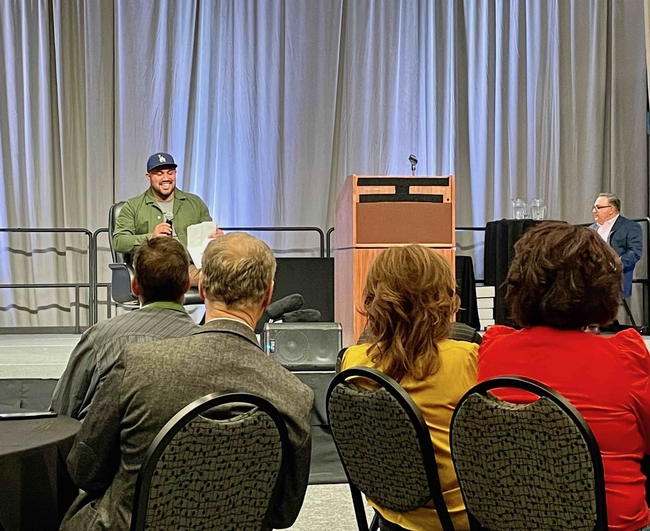
My favorite day of COMPOST2023 was Demo Day, which took place at One Stop Landscaping Supply in Redlands. The place is huge, making it the perfect setting for demonstrations of large-scale composting equipment. As a volunteer, my day started early to direct traffic to the parking area and hand out safety gear to the attendees.
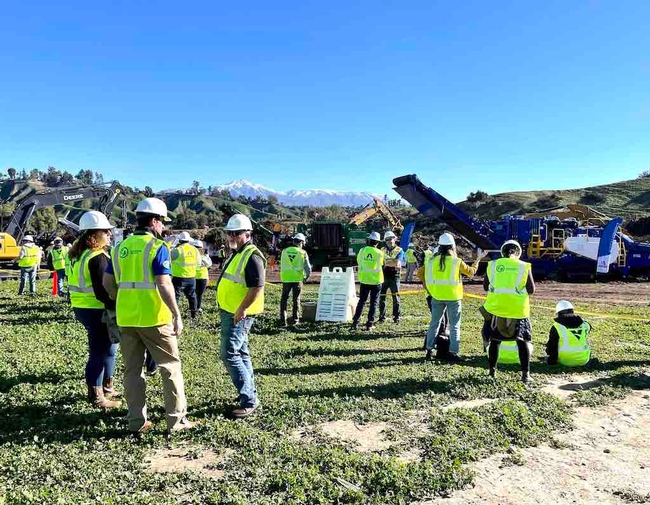
Despite the loud noise of the equipment, the wild burros grazing around the parking lot seemed unfazed. Having only heard about herds of burros roaming San Timoteo Canyon, I was thrilled to see them up close. Although they were quite shy and wandered away when approached, many drivers stopped to snap some photos before heading out.
If this blog has piqued your interest in COMPOST2023, you can find the recordings at Compost University on the US Composting Council website. I'm already looking forward to next year's conference at the Ocean Center Convention Center in Dayton Beach, Florida from February 6th to 9th. The theme of COMPOST2024 is “Making Waves”, which is fitting given the impact composting is sure to have for years to come.
If you want to learn more about composting, check out the videos on our UCCE San Bernardino YouTube channel or contact the Master Gardener Helpline at mgsanbern@ucanr.edu or (909) 387-2182.
Have you enjoyed reading this blog? Do you have questions? Need help with school gardens or environmental education? Feel free to contact me at dschnur@ucanr.edu. I look forward to hearing from you.
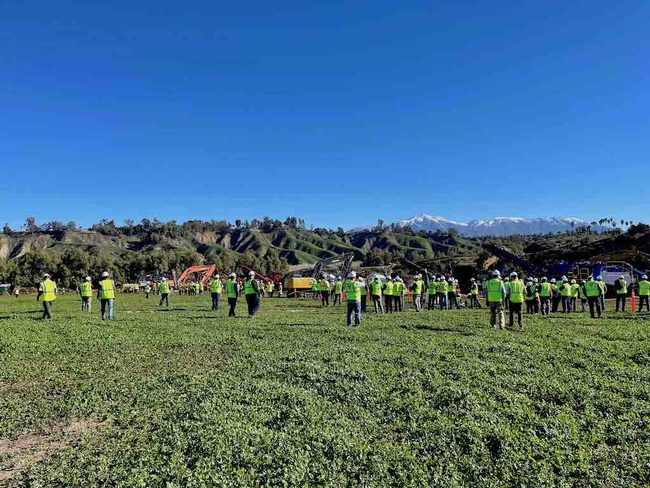
- Author: Deborah Schnur
I couldn't believe it when I heard that COMPOST2023, billed as “the world's largest composting event”, was going to be held in Ontario, California in January. What were the odds that a composting enthusiast such as myself would be so close to the action? I'm so glad I was able to attend as a volunteer! This year's theme was “Capturing Carbon Renewing Soil”, emphasizing the importance of composting in reducing carbon emissions and enhancing soil health.
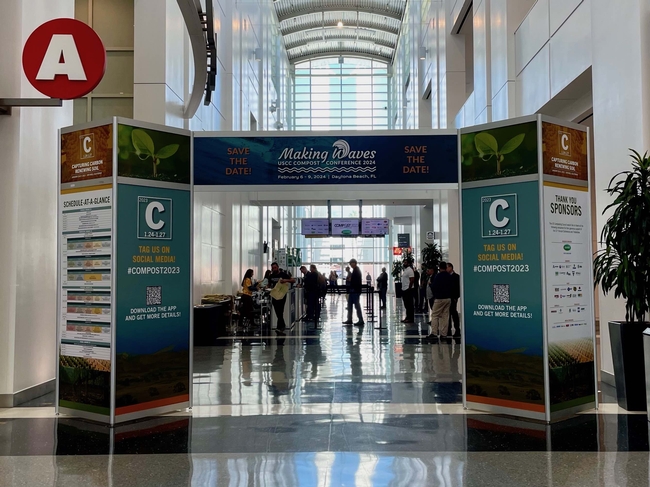
COMPOST2023 ran from Monday, January 23rd to Friday, January 27th, starting with two days of pre-conference activities. On the first day, I attended the Cultivating Community Composting Forum at the Ontario Convention Center. The second day was a Field Day with bus tours of local composting sites. I attended conference sessions at the Convention Center on Wednesday and Thursday and volunteered for Demo Day at One Stop Landscape Supply on Friday. It was a lot to absorb in such a short time.
The Institute for Local Self-Reliance (ILSR) coordinated the Cultivating Community Composting Forum and related Field Day activities. ISLR's Composting for Community Initiative works to advance “local composting to create jobs, enhance soils, protect the climate, and reduce waste through advocacy, training, research, demonstration sites, and coalition building”. The goals of the forum were to share best practices and build support for small-scale, community-based composting.
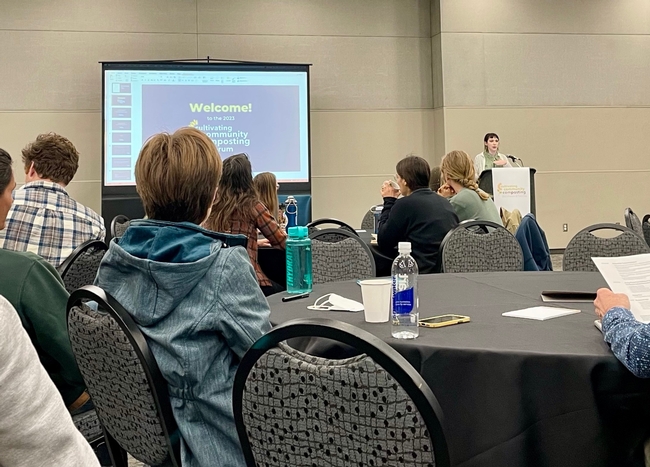
After a short break, the forum attendees reconvened for two peer-to-peer chat sessions on topics including scaling up, business and mission planning, funding and financing, and communications. I attended the sessions on community building and composting methods and best practices. These chats gave me the opportunity to share experiences with composters from across the country–from Peels & Wheels Composting in New Haven, Connecticut to ReMark Composting Solutions in Detroit to Hart's Worm Farm in Irvine.
The afternoon agenda consisted of two concurrent presentation sessions followed by two panels. One of the most memorable presentations was “Generating Excitement About Community Composting in an Urban, Chronically Marginalized Community” by Marvin Hayes and Kenny Moss of the Baltimore Compost Collective. Marvin is the Executive Director of the Collective which collects food scraps from residences and composts them at the Filbert Street Community Garden. Kenny, a student leader in the youth entrepreneurship program, helps manage the composting operations. In a catchy poem, Marvin described the role of composting this way: “Learn so we don't have to burn. Starve the incinerator. Feed the soil. Feed the Community! Clean air for Baltimore.” In 2022, the Baltimore Compost Collective served over 300 customers and increased its waste diversion by 40%.
Kourtnii Brown told the story of how the California Alliance for Community Composting (CACC) launched 120 community composting hubs with a $1.54M Community Composting for Green Spaces grant from CalRecycle. The network of composting sites spanned the state in 6 regions: the Bay Area, Fresno & Central California, the Inland Empire, Greater Los Angeles, Sacramento & Northern California, and Greater San Diego. CACC provided on-site support with skilled staff, infrastructure, community building, and program development. In the summer of 2021, CACC held a Soil Stewardship Training retreat (also called “Soil Summer Camp”) at Amy's Farm to train the trainers at the composting sites. Training recordings are available for public view on YouTube. Since 2020, the sites have diverted millions of organic waste from landfills and produced thousands of cubic yards of compost. The first round of CalRecycle funding just ended in January, and organizations have submitted applications for a second round.
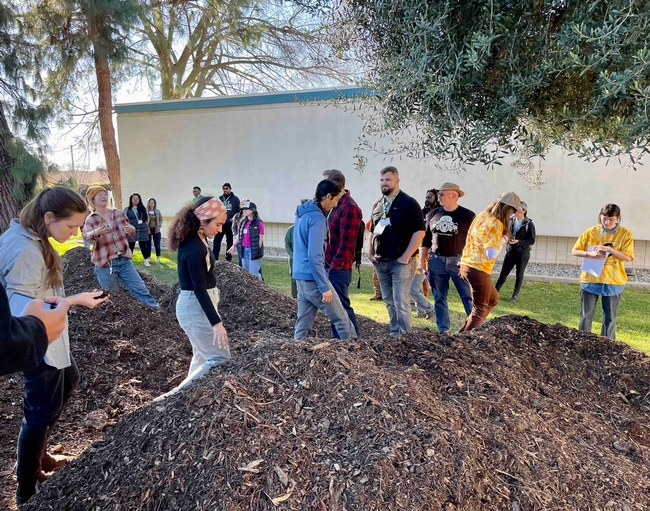
Of the two afternoon composting site tours, I opted for the one that included Temple Beth Israel in Pomona, Claremont Friends Meeting, and the Buddhist Tzu Chi Foundation in San Dimas. Temple Beth Israel was the newest composting site we visited. There are an impressive number of raised beds on the property (around 20 from what I remember), where onions, herbs, greens, and other vegetables are grown in partnership with Uncommon Good. Ten small businesses provide food waste for composting next to the planting beds.
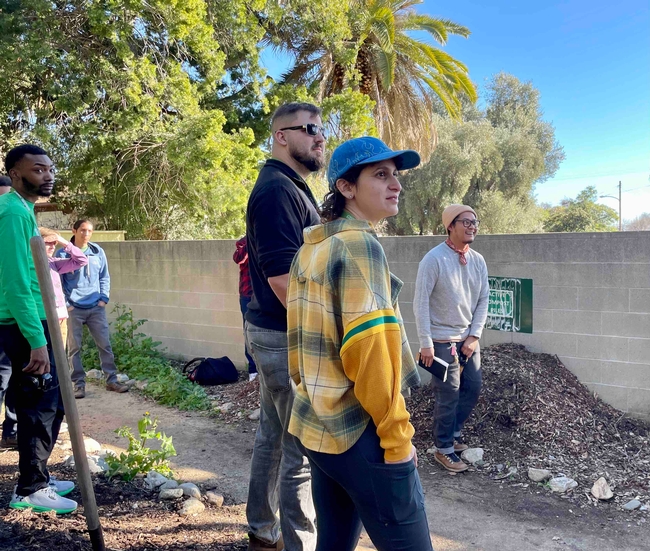
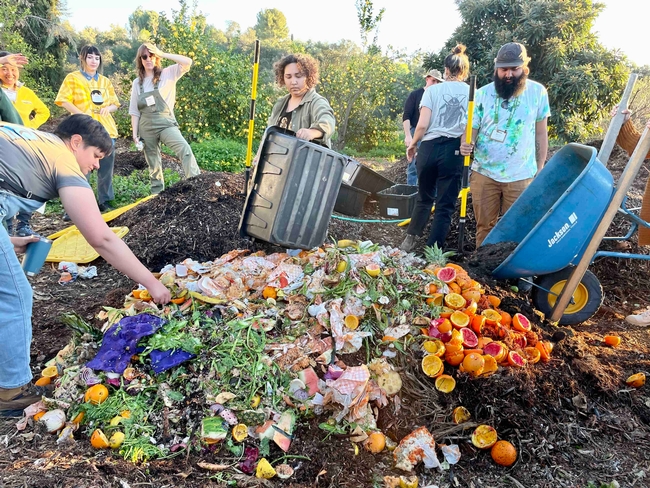
If you want to learn more about composting, check out our UCCE San Bernardino YouTube channel or contact the Master Gardener Helpline at mgsanbern@ucanr.edu or (909) 387-2182.
Have you enjoyed reading this blog? Do you have questions? Need help with school gardens or environmental education? Feel free to contact me at dschnur@ucanr.edu. I look forward to hearing from you.
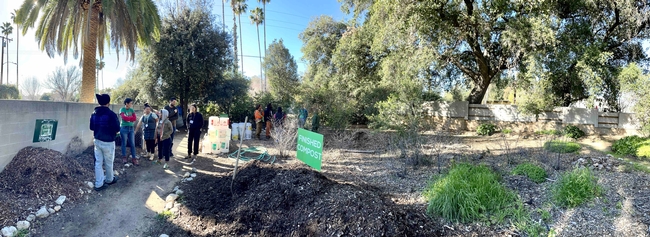
o you want to help residents of San Bernardino County garden and landscape more sustainably; grow food in home, school, and community gardens; and improve the health of our communities? Becoming a University of California Cooperative Extension (UCCE) Master Gardener volunteer may just be for you!
To become a Master Gardener volunteer, you must complete a 50-hour online training course taught by UC and other subject-matter experts.
Important Dates: December 15, 2021: Deadine to complete online application Continuous (through January 7, 2022): Rolling acceptance of applicants on an individual basis.
January 31, 2022: $150 class fee paid online, Master Gardener handbook purchased (not included in tuition: $28-$40), and background check completed (not included in tuition: $25-$40)
April 30, 2021. Final date to complete on-line course requirements (view and complete quizzes for all modules, complete a midterm and final exam, and a class presentation online or in-person.
June 30, 2023: Final date to complete your required 50 volunteer hours. MG program graduation requirements include viewing and completing quizzes on all classes, passing an open book midterm and final exam, and co-presenting
UCCE will ensure the health and safety of accepted applicants and the public served through the program by requiring physical distancing and other precautions as necessitated by COVID-19 throughout the training and volunteer period, including returning to all on-line formats if necessary.
In addition to completing and submitting the online application found here: https://surveys.ucanr.edu/survey.cfm?surveynumber=36040, you must attend (via Zoom) an information/Q and A sessions about the program. Saturday, November 20, 2021 (2-4 PM) Tuesday, November 30, 2021 (7-9 PM) Wednesday, December 1, 2021 (7-9 PM) Saturday, December 4, 2021 (3-5 PM) Saturday, December 11, 2021 (9-11 AM). 
Why did you decide to apply to the UCCE Master Gardener program in San Bernardino County?
I decided to become a UCCE Master Gardener because I was interested in improving my knowledge in pesticide -free food production. I had been growing vegetables and fruit trees but a lot of experimentation and trial-and-error was involved. The UCCE Master Gardener program provides researched based gardening information and training that MGs can then share with diverse communities in a variety of settings.
Tell us about the “climate-ready” landscape tree mulch/no mulch research project you've led for the past several years.
As of February of 2019, I meet up with a group of several UCCE Master Gardeners to measure tree trunk circumference as part of a citizen-science project. The trees for this climate-ready tree study are located at the Chino Basin Water
Note from UCCE Lead Researcher Janet Hartin: Irene and her team (MGs Wayne Borders, Christian Ordaz, Roger Lai, Esther Martinez, Judy Scott, Debi Adams and Kit Leung) have played a critical role in identifying the impacts of mulch vs no mulch on drought, heat, and pest resistant trees that stand up to the challenges of climate change. Properly selected and cared for landscape trees cool urban heat islands, provide shade and habitat, and - at maturity - absorb and store carbon produced by the burning of fossil fuels. The four species of trees (‘Bubba' desert willow, ‘Maverick' mesquite, ‘Red Push' pistache, and ‘Desert Museum' palo verde) included in this project were selected from a larger project at UC Riverside due to our interest in determining the impacts of mulch on tree growth and development and water conservation due to less soil evaporation. Irene's team has meticulously taken quarterly data on tree circumference at two heights and photographed the trees throughout the project.This is just another example of how UCCE Master Gardeners help UCCE's mission to develop

I would tell a San Bernardino resident interested in becoming a MG to apply to the program. They will find that the decision to learn further about gardening and sustainable landscaping will not only enrich their own life but also that of those they share the information with. They will also likely make new friends with others who are also passionate about nature. 

- Author: Margaret J O'Neill
When summer is here and the list of edible fruits and veggies that can be planted in Southern CA is at its shortest,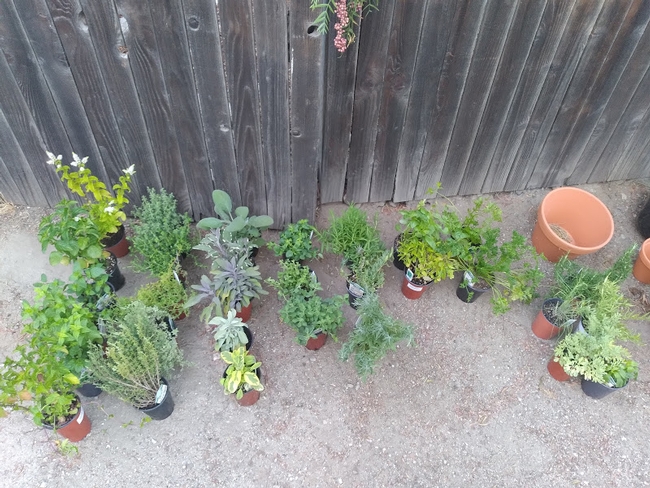
-It takes up very little room and it's portable. The stack of three pots can take up as little as 12 to 14” of space on your porch or growing area. This is great for areas where you don't have a lot of room to grow and it also makes it easy to find room right by your kitchen or porch door. That said, I have gone on to create larger versions of this and mini versions of this and all sorts of versions in between, but the basic set up below is a good place to start before you try different versions.
-Great for many varieties of herbs in a small planting area. The top tier of the herb garden is on the drier side and is great for growing herbs that like a drier soil. I like to put thyme or sage at the top. The middle tier is great for plants that need a little more water, but don't like to be too wet. Herbs like basil, marjoram, oregano, chives, and cilantro will do well on the middle tier of the herb garden. The bottom level is a little damper and is a great place to grow herbs like mint (planting the mint in a pot keeps it from taking over your garden too!), chives, parsley, basil and chervil. Rosemary and fennel do well in the three-tiered system but tend to get big, making them a better choice for a larger herb garden, or planting in beds. Lavender is susceptible to diseases at it's crown and do best planted in well-draining soil and given lots of space to grow.
-It's great for people who forget to water (that's me!!)! The top and middle tier pots have drainage holes so when you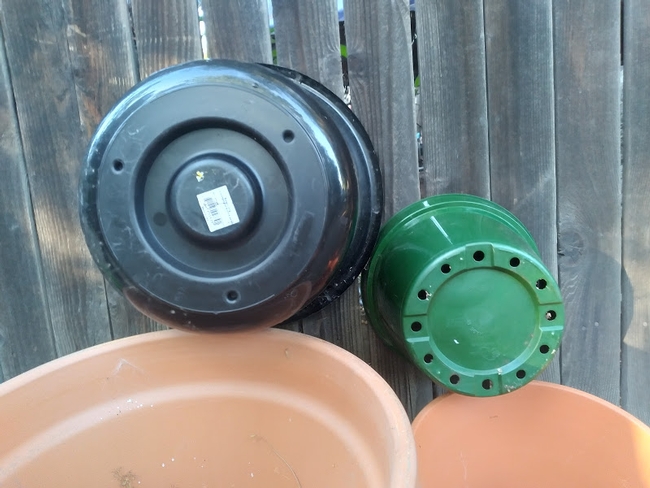
-Great, easy to transport, gifts for people who love plants, and a fun way to get creative in the garden. I got started with one, and I have gone on to make big ones (with a half wine barrel as the bottom pot and then the middle and top pots being 14 and 8 inches across) that can grow a larger volume of herbs that I use a lot of in my kitchen. I have gifted several three-tiered herb gardens and they are always cute and fun gifts!
Follow these easy steps to plant your own three-tiered herb garden and send our Master Gardeners an email or give them a call if you have any questions, we are here to help!!
Supplies needed:
-3 pots of different sizes (for example a 14” pot, an 8” pot and a 4” pot) The top and middle pot should have drainage holes for maximum benefits of stacking. The bottom pot is best with drainage holes to ensure proper water, and prevent salt buildup, but it is less important for the plants that can handle soil that is more moist.
-Good potting mix or soil. You can mix some compost in as well. Herbs, like most fruits and veggies do best in well-draining soil that is rich in organic matter. They don't usually need as much fertilizer as other produce, but you can mix a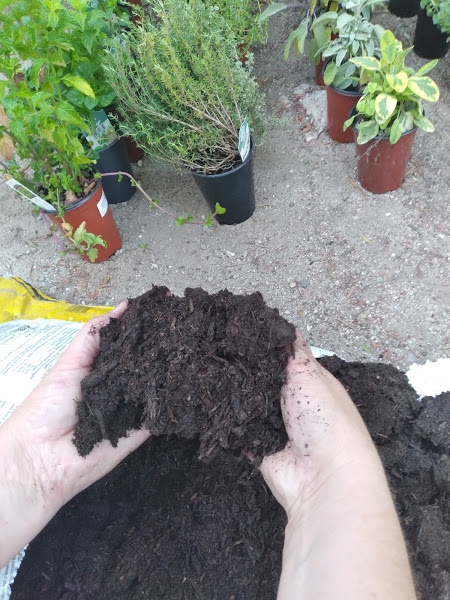
-Your herbs! You can plant transplants or seeds depending on what you prefer, and how much time you have. There are a wide variety of herbs you can plant, but here are a few ideas:
Top tier: sage, thyme or rosemary if you keep it small, or have a large set of pots
Middle tier: sage, thyme, chives (garlic or onion), marjoram, oregano, fennel (with a larger pot system), dill, green onions, chervil,
Bottom tier: Mint, basil, parsley, cilantro, marjoram, oregano, green onions
Step 1) starting with your bottom pot, fill it halfway with soil. Set your plants (I usually put about 4 or 6 plants on the bottom tier depending on how big your pots are) at an angle facing out a bit. Remember that your plants won't have a lot of room on the surface of the soil, but they will have lots of room for their roots to grow under the pots that are stacked on top. Add soil to your transplants as you would when you are doing your regular planting up to the previous soil line, but leave the level in the middle of the pot a little lower so you can set the second pot on top
Step 2) add your second pot (that has drainage holes) to the center of the first pot. Make sure it's level and sitting securely on top of the soil and begin 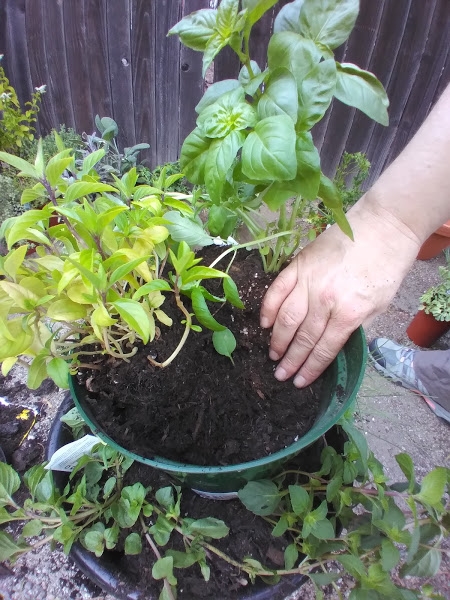
Step 3) add your last, top pot! Depending on how small the top pot is you may need to add a bit of soil to the pot before adding your top plant (usually just one plant), or if the pot is small enough it might not be needed. Just make sure the pot has enough room for your plant, and that you plant is high enough in the pot. Plant that plant as you would normally in the center of your pot, adding soil up the previous fill line.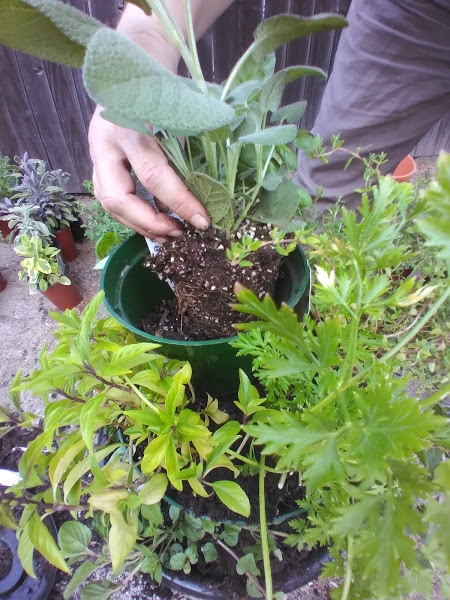
If you are planting seeds on any of the levels you would follow the same steps above, but instead of planting the transplants you add soil to fill the pot (leaving a bit of a depression in the center for the pot above) and then plant the seeds as appropriate for the varieties you are planting.
When you want to refresh a level of your garden you can take the pots apart and repeat the steps above with new additions in empty spaces, or you can just dig down into your pots while they are stacked and replant. You can decide whether you are going to take them apart or not based on your personal preference or on how deep the roots are growing from one pot into the soil below.
In the heat of the summer starting herbs may be a little more challenging from seed, but it can be done if they are protected from too much direct sunlight. Being able to move the tower around easily is helpful if you are trying to start seeds, so you can put them in filtered light until they are a bit more established, then bring them back to your porch or full sun when they are several inches tall.
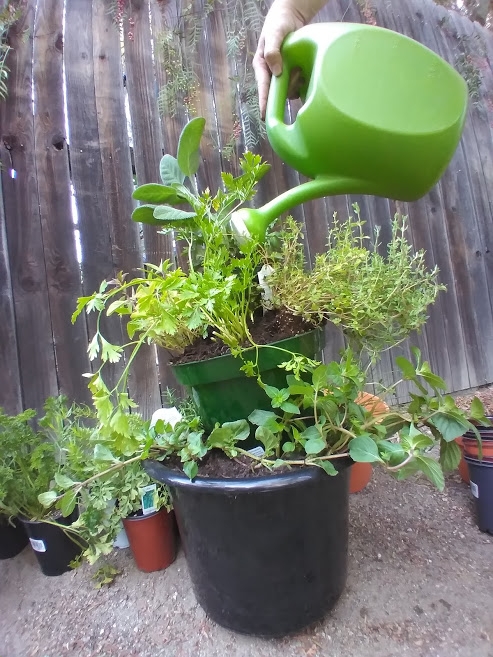
As we are experiencing severe, or worse, drought in California we need to use our water resources carefully. Many of our ornamental shrubs and grasses (is plants a better word here?) can safely have water reduced to conserve water without causing long term damage to them. Our trees, one of our most valuable resources, need to be protected as well, but they can also do ok with strategically reduced water. Growing fruits and veggies take a lot of water so it's important to grow those edibles responsibly. Improper watering, or not enough water, can very quickly lead to problems with fruit set, production and reduced quality and flavor. Herbs are often the same way, and while some types can do ok with reduced water (like rosemary and lavender) most need to be evenly watered to get good leaf production. So, with the drought on everyone's mind you must ask yourself: is growing food at home a good use of water? The answer is yes!! Growing food and herbs at home have many benefits to your mental and physical health! You are also reducing the distance your produce travels from harvest to your kitchen and that can save resources! You can grow the produce you like and engage the family in the activity, having freshly harvested produce right at your doorstep! There are lots of ways to use your water wisely even in your edible garden by using drip irrigation, adding mulch and compost and growing varieties that are suited for your area. The three-tiered herb garden is a great way to have herbs at your doorstep that are easy to care for and take up a small amount of space using minimal resources.
